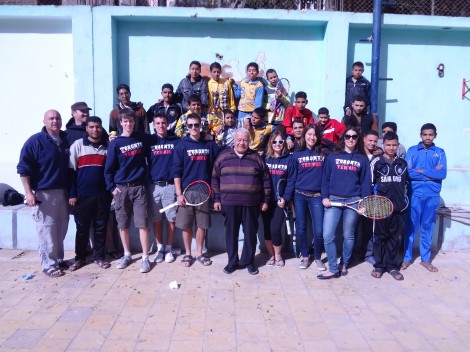David Dorian, who won the 2013 CIS swimming student-athlete community service awards, insists that volunteering “has forced me to interact with people outside my normal circles. Typically the world of sport is pretty closed, and it is hard to get a sense of what’s really going on outside your little bubble.”
Dorian added that volunteering “has helped me take a step back and really look at everything.” This past year, Dorian served as executive director of U of T Friends of Médecins Sans Frontières (Doctors Without Borders).
As executive director, Dorian’s responsibilities included communicating with the MSF head office, and co-ordinating events and speakers to raise awareness on campus and in high schools. “This was a great experience,” said Dorian, “because it helped me work on my leadership skills and I had the opportunity to work with an outstanding team.”

Six members of the Blues tennis team travelled to Egypt on a trip organized by coach Nabil Tadros. PHOTO COURESY NABIL TADROS
Dorian also highlights the two summers he spent as a volunteer at Holland Bloorview Kid’s Rehabilitation Hospital. He found the opportunity online while looking for ways to volunteer as a swim coach. “I wanted to share my passion and knowledge for my sport”, reflects Dorian, “as a way of giving back.”
These themes, of gaining greater perspective and expanding the boundaries of sport by giving back to a broader community, and a strong desire to share a passion for a sport with other people, are evident in the volunteering efforts of other Varsity Blues athletes. Developing personal strength and leadership skills through helping others is a side benefit.
For 15 days over the Christmas holidays, six members of the Blues’ tennis team traveled to Egypt on a community service trip organized by head coach and Egyptian émigré Nabil Tadros. The group traveled to Cairo, Alexandria, Luxor, and Hurghada, playing tennis matches and volunteering at local orphanages.
Speaking about the trip and its impact on both his athletics and academics, third-year player and newly-accepted medical student Cameron Landry remarked that it made him more relaxed both on the court and in his interviews for medical school. Although he had done a lot of traveling in the past, Landry reflects that getting to interact directly with people in the community was a different kind of experience, which gave him a new and stronger sense of what is important, “something I thought I knew,” he said.
Cecelia Pye, in her fourth year of eligibility, says that the trip enhanced her desire to help other people, and increased her enjoyment of her sport and her studies. “I have so many opportunities,” said Pye. “I don’t want to hesitate to take chances.”
Both team members were inspired by their coach, insisting that his selfless energy and connections with community members “really centred the whole trip.” Tadros has organized community service trips to Egypt in the past. He had tried to organize a trip involving the tennis team three years ago, but was forced to cancel the trip when the revolution broke out. He is already planning a similar trip for next year.
In another admirable community service initiative, the mountain biking team spearheaded a Don Trails clean-up event this past May. On Saturday, May 25, approximately 30 volunteers, including mountain biking team members and volunteers from the various public schools, neighbourhood groups, and the Lapdogs cycling team collected about 75 bags of litter and a few hundred pounds of heavy garbage, including tires, old shopping carts, and toasters, from Toronto’s Don Trails.
Over the years, an estimated 17 tons of garbage have been removed from the trails as a result of this annual event. Speaking about the initiative, mountain biking veteran and PhD candidate Chris Wedeles emphasized the importance of taking care of the trails that the team relies on for much of their training, as well as raising awareness about this fabulous recreation resource in the heart of the city. “Riding the trails is more enjoyable if you’re not dodging garbage,” said Wedeles. “It’s just one of those things that need to be done.”
To prepare for the event, the team coordinated with other groups that use the trails, and with Toronto’s department of Urban Forestry. Wedeles hopes that the event will help to carve out a role for cyclists using the trails as environmentalists, and as conscientious custodians.


